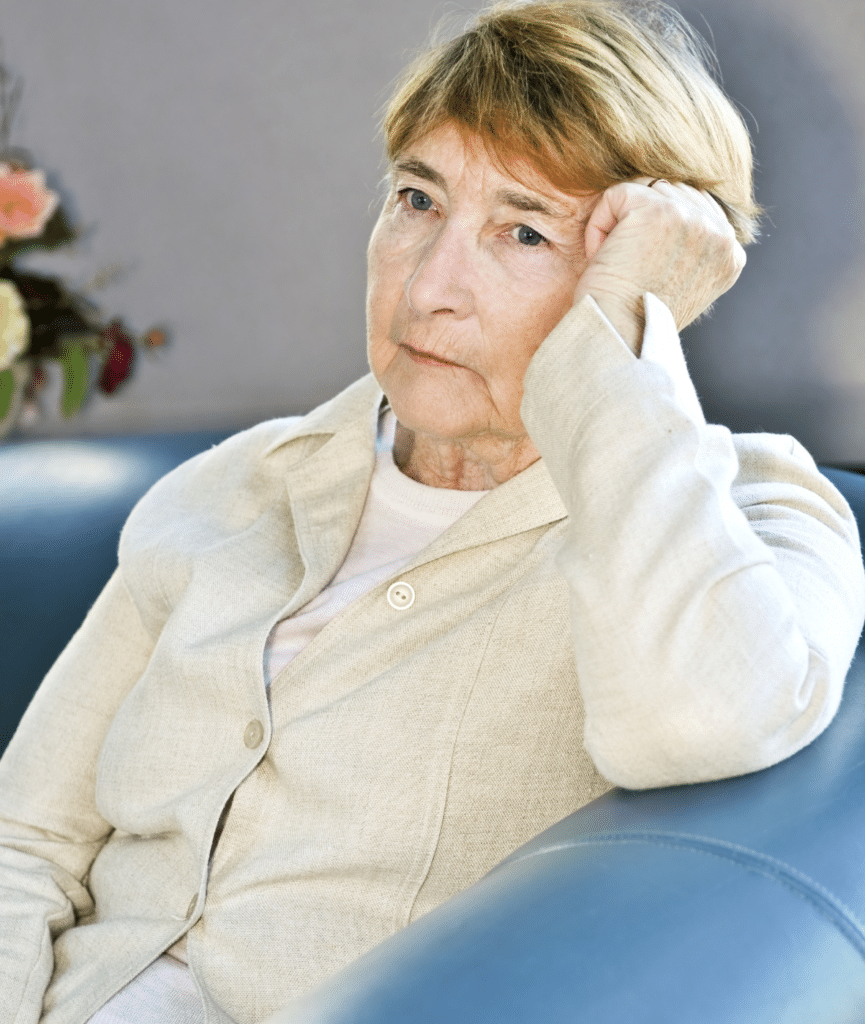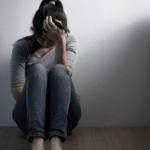Depression in Older Adults – Unique Challenges and Treatment

Depression affects millions of older adults and yet is often overlooked. As you grow older, you may be more likely to face certain challenges, like becoming ill, losing loved ones, or experiencing long periods of isolation, which can all contribute to feeling low.
However, it’s important to know that depression is not a normal part of aging, and can be treated very effectively. On this page, you’ll discover how common depression is for elderly people, what causes it, and late-life depression treatment options. If you have an older loved one in your life, you’ll also learn ways you can help an older person who’s grappling with depression.
How Common Is Depression in Older Adults?
Up to 25% of older people have symptoms of depression, which can rise to 30% of people who have depression in nursing homes or live in a residential care home. Yet up to 85% of older adults don’t receive help for their depression.1-3
Although depression isn’t a normal part of getting older, older adults have often had more life challenges or health issues, which can increase the risk of depression. Depression can be very effectively treated through medication, therapy, and other options.

Key Takeaways
- Depression among older adults is common but often misinterpreted as “just aging”; It’s a treatable medical condition.
- Risk factors include chronic physical illness, mobility issues, social isolation, loss of loved ones, and changes in life circumstances.
- Symptoms in seniors may be subtle or different than in younger adults — fatigue, sleep or appetite changes, physical aches, withdrawal, or memory difficulties instead of obvious sadness.
- Depression in later life often goes undetected or untreated, but effective treatments (therapy, medication, social support, lifestyle changes) can improve quality of life.
Table of Contents
Causes of Elderly Depression
What can increase the risk of developing depression in older adults? Let’s explore some of the things in more detail below.
Social Isolation and Depression in Seniors
Research shows that good social connections are one of the best factors to protect against depression. Whether it’s a friend, family member, or an activity group, it’s good to spend time with others and remind yourself that you are not alone.5
Memory Loss and Depression in Older Adults
Studies suggest that it goes both ways when it comes to memory and depression – depression can lead to memory problems, and memory loss can result in depressive symptoms. When you become more forgetful it may make you feel helpless and less confident, which can impact your mood.6
Stress and Depression in Elderly People
Studies show that if we can manage stress well, we can reduce our symptoms of depression. With that in mind, some useful ways of managing your daily stress levels include getting enough sleep, eating a healthy diet, exercising, finding relaxing hobbies, and doing breathing exercises.8,9
Physical Health and Depression in Older People
Mental Health Care for Seniors
Treatment is available and effective for elders with depression, let’s look at a few treatment options below.
Antidepressants for Older Adults
Antidepressants are an effective way to manage symptoms of depression with a good amount of evidence to support their use.14 They can improve your mood and make your mind feel clearer from depression. The most common types of antidepressants to be prescribed are:
SSRIs for Depression: Selective serotonin reuptake inhibitors (SSRIs) help you to get extra benefit from serotonin, a chemical in the brain, which helps regulate your mood. SSRIs are usually the first type of antidepressant tried with patients because they often have fewer side effects than other medications.15
- SNRIs for Depression: Serotonin-norepinephrine reuptake inhibitors (SNRIs) work in a way similar to SSRIs, but they also affect a chemical and stress hormone called norepinephrine, which affects your fight-and-flight response and can also affect your moods. SNRIs aim to boost the positive effects of serotonin and norepinephrine in the brain. It can be beneficial to target both chemicals if you have tried other antidepressants and have not had the relief from symptoms that you were hoping for, or if you experience anxiety as well as depression.16
As you age, changes in the body can alter the way that medicines are absorbed. Because of this, it is important to tell your doctor about any medications you are taking, and also herbal remedies or supplements, so that any risk of medication interactions can be looked into.17
Therapy for Elderly Depression
Older people often prefer talking therapies, which makes them a great option for treating depression. Therapy can help address any underlying problems that might be triggering or keeping depression going.18 Plus, it teaches you coping strategies for when you feel down.19
Research shows that some of the most effective talking therapies for elderly depression are cognitive behavioural therapy (CBT), behavioural activation, and problem-solving treatments.
Cognitive Behavioral Therapy
This type of therapy aims to help you recognize and change unhelpful thoughts, behaviors, or beliefs that you may have that contribute to your depression. You can learn to challenge and replace these negative thoughts or behaviors with healthier, more positive ones. CBT is considered the best standard we currently have in the field of therapy for treating depression, and it has been researched extensively and found to be effective.20
Behavioral Activation Therapy
This approach focuses on finding connections between your activities and your mood, rather than examining your thoughts and feelings. It can help you to make practical changes that may help lift your mood. Current evidence suggests that this is an effective type of therapy for treating depression in older adults.21
This therapy helps you to identify problems and develop plans to solve them. It is practical and can be used to tackle problems contributing to depression like managing finances, and social isolation. This approach can lead to the person feeling more empowered and able to make decisions for themselves that are positive for their well-being. It’s shown to be effective in helping reduce symptoms of depression in older adults with more severe symptoms.22
How to Help an Elderly Person With Depression
You might be reading this page because someone you love or care about seems depressed and you want to know how to help an elderly person with depression. Some of the best things you can do are be aware of what depression looks like, listen to them, and support them to get the right professional help when needed. Let’s explore how you can do these in a bit more detail.
1. Understand the Symptoms of Depression in Seniors
Do you think someone you love may be depressed? Knowing what symptoms to look for is an important part of helping them, because if they are not aware that they may be depressed then they are not going to be able to reach out for help. Some of the main symptoms of depression in seniors are:17
A sad, anxious, or ‘empty’ type of mood that won’t go away
- Feeling hopeless, guilty, or worthless
- Being irritable or restless
- Losing interest in activities they used to enjoy
- Low energy or feeling fatigued
- Moving or talking more slowly than usual
- Difficulty concentrating or remembering things
- Ignoring responsibilities with work or family
- Sleep problems (waking up too early, sleeping too late)
- Appetite changes
- Thoughts of death, self-harm, or suicide
If they recognize some of these signs, then they may be feeling depressed.
2. Listen First, Then Speak Empathically
Perhaps they don’t show signs outwardly, but when you talk to them they seem to imply their life feels empty, that they feel sad or numb.17 Catching these cues and listening to a person can be a great way to support someone. When you want to talk to them about looking for help for depression, remember to be patient and understanding.
Share your concerns and acknowledge how they feel while gently encouraging them to look for professional help and support. You could offer to help them look into options or to make and attend appointments with them if that would make it feel more manageable for them. Depression is a medical condition that can be effectively treated and shouldn’t be ignored.
You could start a conversation by saying something along the lines of “I’ve noticed you don’t seem like your usual self recently” and let them know that you want to help them. Remind them that depression is a common condition and is treatable. Ask open-ended questions so you can understand how they feel. When you are talking with them, be patient as they might not have thought about how they are feeling, and they may need some time to process what you’ve talked about and whether they may want to seek support.
3. Encourage Them to Seek Professional Help
Depression is a medical condition and should be taken as seriously as any other condition. Receiving professional mental health support can significantly improve the quality of life and well-being of the elderly with depression.
Seeking out support for depression can help to improve mood, reduce isolation, and help you to feel better. Whether that’s through seeking out support groups, visiting the doctor to talk about how you’re doing, talk therapy, or medication, there are options to help you. You don’t have to feel this way.
Seek Support for Depression in a Senior
We’ve looked at some of the risk factors for depression in elders, what treatment options are available, and how you can help support someone who may be struggling. You don’t have to face depression alone.
At Mission Connection, we have a team of understanding and experienced mental health clinicians who are ready to help you with your journey toward healing. You can expect an in-depth assessment carried out by a fully qualified professional along with a unique plan to help you to recover in the best way that you can. We offer a range of treatment approaches that can work for you, no matter how mild or severe your symptoms might be.
We know that the cost of mental health care treatment can be a concern for some people, which is why we offer a whole range of payment options including flexible private pay, insurance plans, and financing plans to help spread the costs over time to ease any financial worries.
Are you ready to start feeling better? Contact us today at 866-338-4505 to discover how we can support you on your healing journey.
References
- Godfrey M et al (2005). Literature and policy review on prevention and services. UK Inquiry into Mental Health and Well-Being in Later Life. London: Age Concern/Mental Health Foundation.
- Healthdirect Australia. (n.d.). Depression in older people. Causes, Symptoms, Treatment | Healthdirect. https://www.healthdirect.gov.au/depression-in-older-people
- Smyth, C. (2014, April 7). Depression in old age ‘is the next big health crisis.’ The Times. https://www.thetimes.com/article/14d7bf03-241f-40ca-b806-a4028daf8d5d?_gl=1*1km0vhp*_gcl_au*MTExNzMxNzYwMC4xNzQxMjYyMzM0*_ga*NzUwNTgzNDg2LjE3NDEyNjIzMzQ.*_ga_X7E6ERDZVV*MTc0MTI2MjMzMy4xLjEuMTc0MTI2MjM3Ni4wLjAuMA
- Luo, Y., Hawkley, L. C., Waite, L. J., & Cacioppo, J. T. (2012). Loneliness, health, and mortality in old age: A national longitudinal study. Social Science & Medicine, 74(6), 907–914. https://doi.org/10.1016/j.socscimed.2011.11.028
- De Risio, L., Pettorruso, M., Collevecchio, R., Collacchi, B., Boffa, M., Santorelli, M., Clerici, M., Martinotti, G., Zoratto, F., & Borgi, M. (2023). Staying connected: An umbrella review of meta-analyses on the push-and-pull of social connection in depression. Journal of Affective Disorders, 345, 358–368. https://doi.org/10.1016/j.jad.2023.10.112
- Yin J, John A, Cadar D. (2024). Bidirectional Associations of Depressive Symptoms and Cognitive Function Over Time. JAMA Netw Open, 7(6):e2416305. doi:10.1001/jamanetworkopen.2024.16305
- WebMD. (n.d.). Depression in older adults. https://www.webmd.com/depression/depression-elderly
- Najimi, A., Abbasian, F., Meftagh, S., Ghasemi, G., & Afshar, H. (2014). The effect of stress management training on stress and depression in women with depression disorders: Using cognitive-behavioral techniques. Journal of Education and Health Promotion, 3(1), 70. https://doi.org/10.4103/2277-9531.134819
- Renner, H. (2018, August 14). Depression and stress management. Healthline. https://www.healthline.com/health/depression/stress-management#what-the-expert-says
- Mental Health Foundation. (n.d.). Mental health in later life. https://www.mentalhealth.org.uk/explore-mental-health/a-z-topics/mental-health-later-life
- Healthy Aging. (2024, September 3). Depression and aging. CDC. https://www.cdc.gov/healthy-aging/about/depression-aging.html
- Craig R, Mindell J (eds) (2007). Health survey for England 2005: health of older people. London: The Information Centre.
- Chew-Graham C, Burns A, Baldwin R (2004). Treating depression in later life: we need to implement the evidence that exists. Editorial. British Medical Journal 329: 181–182.
- Wilson K, Mottram P, Sivanranthan A et al (2001). Antidepressant versus placebo for depressed elderly. Cochrane Database of Systematic Reviews (2). CD000561.
- NHS. (2024, November 20). Overview – Antidepressants. https://www.nhs.uk/mental-health/talking-therapies-medicine-treatments/medicines-and-psychiatry/antidepressants/overview/
- Moret, C., & Briley, M. (2011). The importance of norepinephrine in depression. Neuropsychiatric disease and treatment, 7(Suppl 1), 9–13. https://doi.org/10.2147/NDT.S19619
- Depression and older adults. (2025, February). National Institute on Aging. Retrieved March 6, 2025, from https://www.nia.nih.gov/health/mental-and-emotional-health/depression-and-older-adults
- Givens J, Datto C, Ruckdeschel K et al (2006). Older patients’ aversion to antidepressants: a qualitative study. Journal of General Internal Medicine 21:146–151.
- BACP (2022, January 17). Depression | How counselling can help. https://www.bacp.co.uk/about-therapy/what-therapy-can-help-with/depression/
- Cuijpers, P., Berking, M., Andersson, G., Quigley, L., Kleiboer, A., & Dobson, K. S. (2013). A Meta-Analysis of Cognitive-Behavioural Therapy for Adult Depression, Alone and in Comparison with other Treatments. The Canadian Journal of Psychiatry, 58(7), 376–385. https://doi.org/10.1177/070674371305800702
- Medina-Jiménez, E. A., Acosta-Quiroz, C. O., García-Flores, R., Aguilar-Navarro, S. G., & Sotelo-Ojeda, J. E. (2024). Behavioral Activation Therapy for Depression led by Health Personnel in Older People: A scoping review. Gerontology and Geriatric Medicine, 10. https://doi.org/10.1177/23337214241300652
- Alexopoulos, G. S., Raue, P. J., Kiosses, D. N., Mackin, R. S., Kanellopoulos, D., McCulloch, C., & Areán, P. A. (2011). Problem-Solving therapy and supportive therapy in older adults with major depression and executive dysfunction. Archives of General Psychiatry, 68(1), 33. https://doi.org/10.1001/archgenpsychiatry.2010.177
Depression in Older Adults FAQs
No — while older adults face unique challenges, depression is not a normal or inevitable part of aging. It is a treatable condition, not simply “feeling old.”
Chronic illnesses, physical limitations, loss of loved ones, social isolation, major life changes (like retirement), mobility issues, and reduced social support can all contribute to higher depression risk in seniors.
In older adults, depression may appear as persistent fatigue, sleep or appetite changes, withdrawal from activities, memory problems or confusion, aches or other physical complaints, or low motivation — sometimes without overt sadness.
Yes. Many older adults respond well to treatment, including therapy, medication (when appropriate), social support, and lifestyle adjustments. Treatment plans should consider physical health, medications, and overall wellness goals.
Reach out to a qualified mental health professional or care provider for assessment. Encourage open, compassionate conversation, consider treatment or support options, and ensure social connection, physical activity, and consistent care. Early intervention improves outcomes.
- Signs of Treatment-Resistant Depression
- Signs of Depression Relapse
- Depression-Related Sleep Issues
- Depression Symptom Checklist
- ICD-10 Criteria for Depression
- Major Depressive Disorder (MDD) Symptoms
- Depression Symptoms
- Depression Self-Test
- PHQ-9 Depression Test
- Warning Signs of Depression
- Types of Depression
- Best Therapies for Depression
- Talk Therapy for Depression
- Telehealth for Depression
- Personalized Therapy for Depression
- Holistic Treatment for Depression
- Online Therapy for Depression
- Effective Treatments for Depression
- Medications for Depression
- Treatment-Resistant Depression Options
- Depression Relapse Prevention






